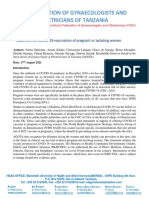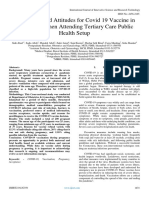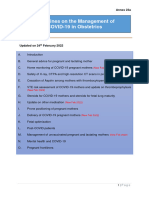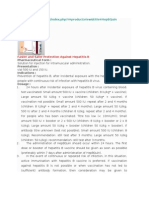FIGO Statement: COVID-19 Vaccination For Pregnant and Breastfeeding Women
FIGO Statement: COVID-19 Vaccination For Pregnant and Breastfeeding Women
Uploaded by
andy.yusrizalCopyright:
Available Formats
FIGO Statement: COVID-19 Vaccination For Pregnant and Breastfeeding Women
FIGO Statement: COVID-19 Vaccination For Pregnant and Breastfeeding Women
Uploaded by
andy.yusrizalOriginal Title
Copyright
Available Formats
Share this document
Did you find this document useful?
Is this content inappropriate?
Copyright:
Available Formats
FIGO Statement: COVID-19 Vaccination For Pregnant and Breastfeeding Women
FIGO Statement: COVID-19 Vaccination For Pregnant and Breastfeeding Women
Uploaded by
andy.yusrizalCopyright:
Available Formats
FIGO Statement
2 March 2021
COVID-19 Vaccination for Pregnant and Breastfeeding Women
Although the absolute risk of severe COVID-19 in pregnancy remains low, it is now established
that pregnant women are at increased risk of severe COVID-19-associated illness compared with
non-pregnant women.1,2,3,4 Such illness can require hospitalisation, intensive care unit admission,
mechanical ventilation and even cause death. Thus, preventing critical COVID-19 infection is of
paramount importance for both the mother and her fetus.
Most countries have availability of COVID-19 vaccines and are offering them to priority groups.
Existing COVID-19 vaccines use different technologies, including messenger RNA (mRNA), viral
vectors, or recombinant proteins manufactured in a baculovirus system that are co-formulated with
adjuvants.5 Clear guidance is needed on whether pregnant and breastfeeding women should
receive a COVID-19 vaccine.
FIGO position
Given that clinical trials of COVID-19 vaccines specifically in pregnant women have not yet been
conducted (some are underway or planned soon6), limited data are available on their efficacy and
safety during pregnancy. Hence, there is not sufficient evidence to recommend the routine use of
COVID-19 vaccines for pregnant or breastfeeding women. Limited data from animal studies are
reassuring and do not indicate direct or indirect harmful effects on embryo/fetal development or
pregnancy.7 Additional reassuring data come from a statement, released in the USA in the first week
of February, that 20,000 pregnant women had been vaccinated with no alarming signs reported.8
FIGO, therefore, considers that there are no risks – actual or theoretical – that would outweigh the
potential benefits of vaccination for pregnant women. We support offering COVID-19 vaccination to
pregnant and breastfeeding women.
Empower women to make informed choices
FIGO urges health care providers to support pregnant women to make an informed decision
regarding COVID-19 vaccination in consultation with their obstetrician. Important considerations
when offering the vaccine should include the:
• level of activity of the virus in the local community
• potential efficacy of the vaccine
• lack of safety data specific to its use in pregnancy
• risk and potential severity of maternal disease, including the possible effects of the disease
on the fetus (preterm birth) and newborn
• timing of vaccination during pregnancy.
Counselling should also address the expected side effects that are considered a normal part of the
body’s reaction to the vaccine, which is more prevalent among younger people due to overreaction
of the immune system. Fever, one of the most common side effects reported with COVID-19
vaccines,9 can be managed by acetaminophen, which is considered safe during pregnancy and
should not theoretically impact the antibody response to COVID-19 vaccines.10 Women should be
particularly reassured that the existing COVID-19 vaccines are not live virus vaccines and that the
mRNA vaccines do not cause any genetic changes since they do not alter human DNA.
FIGO (International Federation Gynecology and Obstetrics) www.figo.org
FIGO Statement
2 March 2021
Following a risk-based approach may put pregnant women at a disadvantage
It is important to highlight that following a risk-based approach – whereby the vaccination is
restricted to pregnant women who are at high risk of exposure to SARS-CoV-2 (e.g. health care
workers) or those with co-morbidities (e.g. diabetes and heart disease) – might put pregnant
women, who are by definition considered at increased risk for severe COVID-19 illness,11 at a
disadvantage due to limited access to the vaccine.
Vaccine administration in pregnant women
There is currently no preference for the use of a particular COVID-19 vaccine, but pregnant women
who agree to be vaccinated should be advised to complete their two-dose series (where
applicable) with the same vaccine product.12 It is advisable that a COVID-19 vaccine series should
be administered without any other vaccine, with a minimum interval of 14 days before or after
administration of any other vaccine.12 Hence, vaccines including Tdap (tetanus toxoid, reduced
diphtheria toxoid and acellular pertussis) and influenza, which are routinely and safely offered
during pregnancy,13 should be deferred for 14 days from the administration of COVID-19 vaccines.
Health care providers are urged to continue to advise their pregnant patients that vaccination
against influenza is safe throughout pregnancy and is recommended during the influenza season
to protect both the woman and fetus from the adverse effects of becoming seriously ill with flu
during pregnancy, particularly so during the COVID-19 pandemic.13 The practice of offering Tdap
vaccine between the 27th and 36th weeks of pregnancy in each pregnancy should also continue to
be followed.13 Pregnant women who decline vaccination against COVID-19 should be supported in
their decision and should be updated with new evidence when it becomes available.
Women planning their pregnancy can take the COVID-19 vaccine if they choose to do so. Routine
testing for pregnancy before COVID-19 vaccination is not recommended. Women who are trying to
become pregnant do not need to postpone pregnancy after receiving a COVID-19 vaccine.
Vaccine administration for breastfeeding women
Breastfeeding confers many health benefits to mother and newborn. COVID-19 vaccines are
believed to pose minimal to no potential risk to the newborn through breastmilk.14 Based on
previously administered vaccines, there is the potential for direct neonatal benefit if the
vaccine-stimulated immunoglobulin A prove to pass through breastmilk. 14 For breastfeeding
women, therefore, the COVID-19 vaccine can be offered if the mother meets the criteria based on
prioritisation groups, such as a breastfeeding health care provider.
As additional data from clinical trials and vaccinated pregnant women become available, it will be
imperative for obstetricians to keep up to date with that information.
FIGO commits to taking the following actions
• FIGO will encourage and support the publication and dissemination of all available data on
vaccination in pregnant and breastfeeding women.
• We will advocate for the administration of the COVID-19 vaccination to all pregnant women.
• When more research data is available, FIGO will review this statement and any advice we
have provided to ensure it is clear and accurate.
FIGO (International Federation Gynecology and Obstetrics) www.figo.org
FIGO Statement
2 March 2021
References
1 Zambrano LD, Ellington S, Strid P, et al. Update: characteristics of symptomatic women of reproductive age with
laboratory-confirmed SARS-CoV-2 infection by pregnancy status - United States, January 22-October 3, 2020. CDC
COVID-19 Response Pregnancy and Infant Linked Outcomes Team. MMWR Morb Mortal Wkly Rep 2020;69:1641-7.
2 Delahoy MJ, Whitaker M, O'Halloran A, et al. Characteristics and maternal and birth outcomes of hospitalized pregnant
women with laboratory-confirmed COVID-19 - COVID-NET, 13 states, March 1-August 22, 2020. COVID-NET
Surveillance Team. MMWR Morb Mortal Wkly Rep 2020;69:1347-54.
3 Panagiotakopoulos L, Myers TR, Gee J, et al. SARS-CoV-2 infection among hospitalized pregnant women: reasons for
admission and pregnancy characteristics - eight U.S. health care centers, March 1-May 30, 2020. MMWR Morb Mortal
Wkly Rep 2020;69:1355-9.
4 Allotey J, Stallings E, Bonet M, et al. Clinical manifestations, risk factors, and maternal and perinatal outcomes of
coronavirus disease 2019 in pregnancy: living systematic review and meta-analysis. BMJ 2020;370:m3320.
5 Rasmussen SA, Kelley CF, Horton JP, et al. Coronavirus Disease 2019 (COVID-19) Vaccines and pregnancy: What
obstetricians need to know. Obstet Gynecol 2021 Mar 1;137(3):408-414.
6 Available at: https://www.pfizer.com/news/press-release/press-release-detail/pfizer-and-biontech-commence-global-
clinical-trial-evaluate
7 U.S. Food and Drug Administration. Available at: https://www.fda.gov/media/144434/download
8
Address by Dr. Fauci. Available at: www.politico.com/video/2021/02/10/fauci-20-000-pregnant-women-vaccinated-with-
no-red-flags-127024
9 Centers for Disease Control and Prevention. Local reactions, systemic reactions, adverse events, and serious adverse
events: Pfizer-BioNTech COVID-19 vaccine. Available at:
https://www.cdc.gov/vaccines/covid-19/info-by-manufacturer/pfizer/reactogenicity.html
10 Saleh E, Moody MA, Walter EB. Effect of antipyretic analgesics on immune responses to vaccination. Hum Vaccin
Immunother 2016 Sep;12(9):2391-402.
11 Centers for Disease Control and Prevention. People with Certain Medical Conditions. Available at:
https://www.cdc.gov/coronavirus/2019-ncov/need-extra-precautions/people-with-medical-conditions.html
12 Centers for Disease Control and Prevention. Interim Clinical Considerations for Use of mRNA COVID-19 Vaccines
Currently Authorized in the United States. Available at: https://www.cdc.gov/vaccines/covid-19/info-by-product/clinical-
considerations.html
13 Nassar AH, Visser GHA, Nicholson WK, et al; FIGO Safe Motherhood, Newborn Health Committee. FIGO Statement:
Vaccination in pregnancy. Int J Gynaecol Obstet 2021 Feb;152(2):139-143.
14 Dooling K, Marin M, Wallace M, et al. The Advisory Committee on Immunization Practices’
updated interim recommendation for allocation of COVID-19 vaccine - United States, December 2020. MMWR Morb
Mortal Wkly Rep 2021;69:1657–60.
About FIGO
FIGO is a professional organisation that brings together obstetrical and gynaecological associations from all
over the world. FIGO’s vision is that women of the world achieve the highest possible standards of physical,
mental, reproductive and sexual health and wellbeing throughout their lives. We lead on global programme
activities, with a particular focus on sub-Saharan Africa and South East Asia.
FIGO advocates on a global stage, especially in relation to the Sustainable Development Goals (SDGs)
pertaining to reproductive, maternal, newborn, child and adolescent health and non-communicable diseases
(SDG3). We also work to raise the status of women and enable their active participation to achieve their
reproductive and sexual rights, including addressing female-genital mutilation (FGM) and gender-based
violence (SDG5).
We also provide education and training for our Member Societies and build capacities of those from low-
resource countries through strengthening leadership, good practice and promotion of policy dialogues.
FIGO is in official relations with the World Health Organization (WHO) and a consultative status with the
United Nations (UN).
For enquiries Rob Hucker, Head of Communications and Engagement
rob@figo.org +44 (0) 7383 025 731
FIGO (International Federation Gynecology and Obstetrics) www.figo.org
You might also like
- Agota Statement On COVID 19 Vaccination of Pregnant and Lactating - 17-8-21Document5 pagesAgota Statement On COVID 19 Vaccination of Pregnant and Lactating - 17-8-21prisco linusiNo ratings yet
- COVID-19 Vaccines, Pregnancy and Breastfeeding 2Document1 pageCOVID-19 Vaccines, Pregnancy and Breastfeeding 2ameesalimsNo ratings yet
- COVID-19 Vaccination in Pregnancy and Postpartum (Literature Review)Document21 pagesCOVID-19 Vaccination in Pregnancy and Postpartum (Literature Review)Ardiya OktamaNo ratings yet
- The Pfizer BioNTech (BNT162b2) COVID-19 Vaccine - What You Need To KnowDocument5 pagesThe Pfizer BioNTech (BNT162b2) COVID-19 Vaccine - What You Need To KnowdianavemNo ratings yet
- COVID-19 Vaccine and Pregnancy A Safety Weapon Against PandemicDocument10 pagesCOVID-19 Vaccine and Pregnancy A Safety Weapon Against Pandemicdr.ulfaluthfianiNo ratings yet
- The Importance of Continuing Breastfeeding During CoronavirusDocument3 pagesThe Importance of Continuing Breastfeeding During CoronavirusPam MoyolemaNo ratings yet
- USL Bahasa InggrisDocument6 pagesUSL Bahasa InggrisDilla auliaNo ratings yet
- 2021 06 30 Coronavirus Covid 19 Vaccination in PregnancyDocument19 pages2021 06 30 Coronavirus Covid 19 Vaccination in PregnancyRahmayantiYuliaNo ratings yet
- Preprints202209 0430 v2Document23 pagesPreprints202209 0430 v2rennanfromNo ratings yet
- 495-Article Text-2850-1-10-20210902Document18 pages495-Article Text-2850-1-10-20210902Rita HardiantiNo ratings yet
- COVID-19 Vaccination in Pregnancy and Lactation Current Research and Gaps in UnderstandingDocument8 pagesCOVID-19 Vaccination in Pregnancy and Lactation Current Research and Gaps in Understandingdr.ulfaluthfianiNo ratings yet
- Acceptance and Attitudes For Covid 19 Vaccine in Pregnant Women Attending Tertiary Care Public Health SetupDocument5 pagesAcceptance and Attitudes For Covid 19 Vaccine in Pregnant Women Attending Tertiary Care Public Health SetupInternational Journal of Innovative Science and Research TechnologyNo ratings yet
- 1642214359314013Document6 pages1642214359314013cersei.seri.sera.10No ratings yet
- WHO 2019 NCoV FAQ Pregnancy Vaccines 2022.1 EngDocument5 pagesWHO 2019 NCoV FAQ Pregnancy Vaccines 2022.1 Engdr.ulfaluthfianiNo ratings yet
- Are COVID-19 Vaccines Safe in PregnancyDocument2 pagesAre COVID-19 Vaccines Safe in PregnancyCarla MesquitaNo ratings yet
- COVID-19 Vaccine Acceptability During Pregnancy Among Bangsamoro Pregnant Women and Their SpousesDocument6 pagesCOVID-19 Vaccine Acceptability During Pregnancy Among Bangsamoro Pregnant Women and Their SpousesPsychology and Education: A Multidisciplinary JournalNo ratings yet
- Vaccines 10 00246Document17 pagesVaccines 10 00246john paul carasNo ratings yet
- Research Paper in English: Perception On COVID-19 Vaccines of Residents in Barangay Canlapwas, Pagsanghan SamarDocument10 pagesResearch Paper in English: Perception On COVID-19 Vaccines of Residents in Barangay Canlapwas, Pagsanghan SamarDivina CacheroNo ratings yet
- The Sinovac VaccineDocument4 pagesThe Sinovac VaccineMontasir BalambagNo ratings yet
- The Moderna COVID-19 (mRNA-1273) Vaccine - What You Need To KnowDocument5 pagesThe Moderna COVID-19 (mRNA-1273) Vaccine - What You Need To KnowdianavemNo ratings yet
- Guidelines Pregnancy & Covid 19Document4 pagesGuidelines Pregnancy & Covid 19Agrave Mikhael JamesNo ratings yet
- CDC - COVID-19 Vaccines While Pregnant or BreastfeedingDocument7 pagesCDC - COVID-19 Vaccines While Pregnant or Breastfeedingdr.ulfaluthfianiNo ratings yet
- Section 44Document5 pagesSection 44Mark Christian GlindroNo ratings yet
- CanadianDocument31 pagesCanadianMona HelouNo ratings yet
- Protecting Breastfeeding During The COVID-19 PandeDocument7 pagesProtecting Breastfeeding During The COVID-19 PandeRintha Aulia ParamithaNo ratings yet
- COVID-19 Concerns, Influenza Vaccination History and Pregnant Women's COVID-19 Vaccine Acceptance: A Systematic ReviewDocument13 pagesCOVID-19 Concerns, Influenza Vaccination History and Pregnant Women's COVID-19 Vaccine Acceptance: A Systematic ReviewIJPHSNo ratings yet
- Who Can Take The Pfizer-Biontech Covid-19 Vaccine?Document4 pagesWho Can Take The Pfizer-Biontech Covid-19 Vaccine?Hazel EstayanNo ratings yet
- Lactmed. Drugs and Lactation Database (Lactmed) Since 2006 Till Now. Ncbi. Bethesda (MD) : National Library of Medicine (Us) 2006Document11 pagesLactmed. Drugs and Lactation Database (Lactmed) Since 2006 Till Now. Ncbi. Bethesda (MD) : National Library of Medicine (Us) 2006Anisa Aprilia AdhaNo ratings yet
- ANNEX 23a Guidelines On The Management of COVID 19 in Obstetrics 05042022Document36 pagesANNEX 23a Guidelines On The Management of COVID 19 in Obstetrics 05042022Hidayah RoslizanNo ratings yet
- 1 s2.0 S1198743X23002938 MainDocument7 pages1 s2.0 S1198743X23002938 MainfatimaezzahraeelouafyNo ratings yet
- Coronavirus (COVID-19) and Pregnancy: What Maternal-Fetal Medicine Subspecialists Need To KnowDocument6 pagesCoronavirus (COVID-19) and Pregnancy: What Maternal-Fetal Medicine Subspecialists Need To KnowRema AmerNo ratings yet
- Management of Varicella Infection (Chickenpox) in Pregnancy: Sogc Clinical Practice GuidelineDocument6 pagesManagement of Varicella Infection (Chickenpox) in Pregnancy: Sogc Clinical Practice GuidelineAndi NugrohoNo ratings yet
- The Time of COVID - Phillip AltmanDocument107 pagesThe Time of COVID - Phillip AltmanYunSang ShinNo ratings yet
- Vaccinations For Pregnant Women: Clinical Expert SeriesDocument16 pagesVaccinations For Pregnant Women: Clinical Expert SeriesIzzatul YazidahNo ratings yet
- Annex 48 Clinical Guidelines For Covid in Malaysia 4th Edition 19102021 FinaleDocument175 pagesAnnex 48 Clinical Guidelines For Covid in Malaysia 4th Edition 19102021 FinaleEfendi AnuarNo ratings yet
- Maternal and Neonatal Immunization Field Guide OPSDocument39 pagesMaternal and Neonatal Immunization Field Guide OPSJorge Ricardo Uchuya GómezNo ratings yet
- Mode of Delivery Among Pregnant Women During The Covid 19 Pandemic Literature Review For Capstone 2021 2Document7 pagesMode of Delivery Among Pregnant Women During The Covid 19 Pandemic Literature Review For Capstone 2021 2api-547606957No ratings yet
- Vecination PregnsDocument15 pagesVecination PregnsJesus Fernandez AlvarezNo ratings yet
- Update 4 - ASRM PATIENT MANAGEMENT AND CLINICAL RECOMMENDATIONS DURING THE CORONAVIRUS (COVID-19) PANDEMICDocument9 pagesUpdate 4 - ASRM PATIENT MANAGEMENT AND CLINICAL RECOMMENDATIONS DURING THE CORONAVIRUS (COVID-19) PANDEMICardirshajiNo ratings yet
- Review of Related LiteratureDocument5 pagesReview of Related LiteratureZoe Yzabel EgarNo ratings yet
- The Janssen Ad26.COV2.S COVID-19 Vaccine - What You Need To KnowDocument5 pagesThe Janssen Ad26.COV2.S COVID-19 Vaccine - What You Need To KnowdianavemNo ratings yet
- Breast Milk and Vaccinations During A Pandemic: Rationalising The RisksDocument4 pagesBreast Milk and Vaccinations During A Pandemic: Rationalising The RisksAchmad RyandaNo ratings yet
- Understanding Vaccine Evaluation and Safety As An Approach To Addresing Parental ConcernsDocument6 pagesUnderstanding Vaccine Evaluation and Safety As An Approach To Addresing Parental Concernsguillermo benavidesNo ratings yet
- Guidance For Management - of - Pregnant - Women - in - COVID19 - Pandemic - 12042020Document17 pagesGuidance For Management - of - Pregnant - Women - in - COVID19 - Pandemic - 12042020Avadhesh SharmaNo ratings yet
- American Society For Reproductive Medicine (Asrm) Patient Management and Clinical Recommendations During The Coronavirus (Covid-19) PandemicDocument8 pagesAmerican Society For Reproductive Medicine (Asrm) Patient Management and Clinical Recommendations During The Coronavirus (Covid-19) PandemicIoana Adina RugescuNo ratings yet
- Maternal VaccinationDocument16 pagesMaternal VaccinationAnonymous l6Q1ROq2No ratings yet
- Labor and Delivery Guidance For COVID-19Document11 pagesLabor and Delivery Guidance For COVID-19Bernas Arion NapitupuluNo ratings yet
- CovidDocument12 pagesCovidAngel SousouNo ratings yet
- Final Requirement (FINAL EXAM)Document4 pagesFinal Requirement (FINAL EXAM)KATHLEEN JOSOLNo ratings yet
- Nihss PDFDocument11 pagesNihss PDFJidanNo ratings yet
- WHO UNICEF Zikavac TPP Feb2017Document17 pagesWHO UNICEF Zikavac TPP Feb2017Manuel OropezaNo ratings yet
- Journal Homepage: - : IntroductionDocument4 pagesJournal Homepage: - : IntroductionIJAR JOURNALNo ratings yet
- Makins A, 2020Document3 pagesMakins A, 2020zakiaNo ratings yet
- BIMA Oxford AZ Vaccine Detailed Position StatementDocument5 pagesBIMA Oxford AZ Vaccine Detailed Position StatementVegha NedyaNo ratings yet
- COVID Vaccination in Pregnancy Joint StatementDocument2 pagesCOVID Vaccination in Pregnancy Joint StatementWMBF NewsNo ratings yet
- COVID Vaccination in Pregnancy Joint Statement-2021!08!12Document2 pagesCOVID Vaccination in Pregnancy Joint Statement-2021!08!12Maegan CarterNo ratings yet
- The Effect of The COVID-19 Pandemic On Maternal Health Due To Delay in Seeking Health Care Experience From Tertiary CenterDocument5 pagesThe Effect of The COVID-19 Pandemic On Maternal Health Due To Delay in Seeking Health Care Experience From Tertiary Centerasm obginNo ratings yet
- Labor and Delivery Guidance For COVID-19Document10 pagesLabor and Delivery Guidance For COVID-19ALfuNo ratings yet
- The Vaccine Handbook: A Practical Guide for Clinicians, Twelfth EditionFrom EverandThe Vaccine Handbook: A Practical Guide for Clinicians, Twelfth EditionNo ratings yet
- Influenza vaccination: What does the scientific proof say?: Could it be more harmful than useful to vaccinate indiscriminately elderly people, pregnant women, children and health workers?From EverandInfluenza vaccination: What does the scientific proof say?: Could it be more harmful than useful to vaccinate indiscriminately elderly people, pregnant women, children and health workers?No ratings yet
- Confirmation Notice PDFDocument2 pagesConfirmation Notice PDFHumberto urribarri100% (1)
- The Public Health Problem in The Reduction of The Uptake of Nopv2 Oral Polio Vaccines - A Case Study ofDocument7 pagesThe Public Health Problem in The Reduction of The Uptake of Nopv2 Oral Polio Vaccines - A Case Study ofdennisNo ratings yet
- Super-Potent Human Antibodies Protect Against COVID-19 in Animal TestsDocument4 pagesSuper-Potent Human Antibodies Protect Against COVID-19 in Animal Tests--No ratings yet
- Community DevelopmentDocument7 pagesCommunity DevelopmentkleoNo ratings yet
- Acupuncture ItrDocument85 pagesAcupuncture ItrVpr OmNo ratings yet
- Revised ManuscriptDocument88 pagesRevised ManuscriptKANT JAMES D. MAHANNo ratings yet
- 1522-1588 USMLE QuestionsDocument67 pages1522-1588 USMLE QuestionsKiran KrupaNo ratings yet
- Annex 2 WHO Good Manufacturing Practices For Biological ProductsDocument38 pagesAnnex 2 WHO Good Manufacturing Practices For Biological ProductsantapanikidulNo ratings yet
- Đề Thi Học Sinh Giỏi Thành Phố Lớp 12 TP Hải Phòng Môn Tiếng Anh Bảng Không Chuyên 2019-2020Document4 pagesĐề Thi Học Sinh Giỏi Thành Phố Lớp 12 TP Hải Phòng Môn Tiếng Anh Bảng Không Chuyên 2019-2020Ý Nguyễn Thị NhưNo ratings yet
- Part Iv PDFDocument89 pagesPart Iv PDFRandolph QuilingNo ratings yet
- Reading Comprehension 1Document3 pagesReading Comprehension 1ADI FIANNo ratings yet
- MODULE 1 - Inam Nqumse 990305 5161 083 Farming ManagementDocument56 pagesMODULE 1 - Inam Nqumse 990305 5161 083 Farming ManagementInam AfrikaNo ratings yet
- Listado Estudios UdeAlberta CanadaDocument74 pagesListado Estudios UdeAlberta CanadaElenaNo ratings yet
- 128 Research Papers Supporting The Vaccine Autism LinkDocument96 pages128 Research Papers Supporting The Vaccine Autism LinkEllaNo ratings yet
- The Lightning-Fast Quest For COVID Vaccines - and What It Means For Other DiseasesDocument3 pagesThe Lightning-Fast Quest For COVID Vaccines - and What It Means For Other DiseasesKathiravan M NNo ratings yet
- Vacination NotesDocument8 pagesVacination NotesJamesNo ratings yet
- Persuasive SpeechDocument2 pagesPersuasive SpeechRonn ArtajoNo ratings yet
- Practices of Healing in Tribal GujaratDocument8 pagesPractices of Healing in Tribal GujaratSabina AhmedNo ratings yet
- Urn Uvci 01 Ro 230dmyqx5erjr4wvdxj719kv6wop8l#tDocument2 pagesUrn Uvci 01 Ro 230dmyqx5erjr4wvdxj719kv6wop8l#tPaul CoevNo ratings yet
- Donor Selection and Blood CollectionDocument14 pagesDonor Selection and Blood CollectionMary ChristelleNo ratings yet
- Office THE: OF SecretaryDocument9 pagesOffice THE: OF SecretaryAling KinaiNo ratings yet
- Advances en Pediatrics 2013Document395 pagesAdvances en Pediatrics 2013Gris C. RicoNo ratings yet
- Model Paper 6Document6 pagesModel Paper 6Dr-Sanjay SinghaniaNo ratings yet
- Hep BquinDocument2 pagesHep BquinIvan Rangga GunawanNo ratings yet
- Considering Emotion in COVID 19 Vaccine Communication Addressing Vaccine Hesitancy and Fostering Vaccine ConfidenceDocument6 pagesConsidering Emotion in COVID 19 Vaccine Communication Addressing Vaccine Hesitancy and Fostering Vaccine ConfidencehelenNo ratings yet
- Data ScientistDocument4 pagesData ScientistAngelina ProtikNo ratings yet
- Summary of The Spike Protein ProtocolDocument4 pagesSummary of The Spike Protein ProtocolkatiaNo ratings yet
- Prince BhatiDocument42 pagesPrince BhatiShivani JainNo ratings yet
- Des 2014Document6 pagesDes 2014HisokagenNo ratings yet
























































































